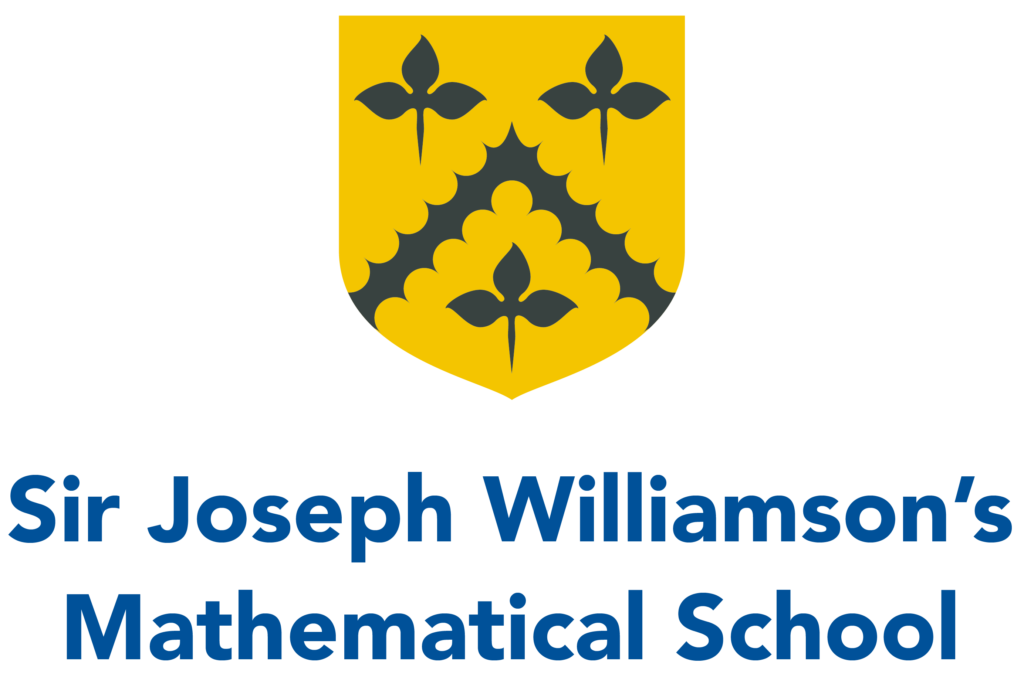The main aim of the computing department is to “…equip(s) pupils to use computational thinking and creativity to understand and change the world” (NC, 2013).
The Computing Department at Sir Joseph Williamson’s Mathematical School aims to do this by teaching the underlying skills and knowledge required for pupils to be able to autonomously solve an array of different problems through a series of project based units in a variety of languages and applications. We aim to enable students to independently analyse problems, design, develop and implement solutions, and test and evaluate their successes. In order to do this, students will need to have good analytical skills founded on experience of a number of programming constructs. The foundation of this is an understanding of the “fundamental principles and concepts of computer science, including abstraction, logic, algorithms and data representation” (NC, 2013). In addition, we develop pupils’ theoretical understanding of how systems work, ensure they are digitally literate and are made fully aware of the potential dangers in use of the Internet and the responsibilities they have as a future e-citizen.
The KS3 programme aims to give pupils a wide flavour of computing. Pupils enter the school in Year 7 with a varied experience of computing. Skills are developed initially through the use of more visual based applications which enables even those pupils who have had quite a limited computing experience at their previous schools, to still fully access the concepts being explored. The underlying understanding of programming constructs is reinforced in these early stages so pupils can move on to more complex applications with a sound theoretical foundation. Pupils are encouraged to share their ideas about their system development throughout Key Stage Three. Pupils are encouraged to discuss their work, and support each other when appropriate. The department has a strong emphasis on pupils documenting their iterative development throughout each project. This reflects the importance placed by most computing based workplace environments on team approaches to programming challenges. The curriculum supports this by supplying template documents to scaffold the written parts of the units. Every lesson and its resources is placed on Google Classroom to support out of hours learning and to assist pupils when they embark on revision for unit tests. Support is often provided by teachers through this platform when pupils struggle with classwork and homework.
Choice of content:
- A series of varied units aim to build understanding of the core principles and concepts that underpin computing. Developing skills and confidence over time to ensure pupils become responsible, creative and autonomous participants in a digital world.
- Development of an understanding of the technology used around them so that they can make informed choices about how to use and express themselves both in school and the workplace beyond.
- An awareness of the underlying mathematics and science that shapes our digital age and an appreciation of how technology may develop further into the future.
Pupils can opt to study Computing at GCSE level and at A level. Pupils who do not opt to take GCSE Computing at Key Stage 4 undertake the Inspiring Digital Enterprise Award – developing their understanding and awareness of Online Safety, learning how to design and create digital artefacts, developing problem-solving skills, developing code-based solutions and analysing and manipulating data sets. This gives pupils the opportunity to obtain an industry- recognised qualification which can be used to help demonstrate their digital and enterprise skills to potential employers.
In order to meet the obligations of the National Curriculum in Computing, every Year 10 & 11 student must complete at least 9 compulsory iDEA ‘badges’ in the following order:
- Citizen Category – Online Safety
- Citizen Category – Safe Online
- Citizen Category – Digital Ethics
- Worker Category – Digital Research
- Worker Category – Digital Portfolios
- Maker Category – Animation
- Maker Category – Coding Solutions
- Entrepreneur Category – Problem solving
- Entrepreneur Category – Big data
Beyond these compulsory badges, we encourage students to complete others, working towards Bronze or Silver Awards.
Whilst the content of the Key Stage 4 and 5 examination board specification dictates the content delivered, the approach taken by the department is to deliver this content through practical programming and real life contextual work wherever possible. Some overarching concepts are taught holistically and are frequently re-visited and developed to develop stronger topic knowledge. Advances in technology and computing are transforming our world, especially in the workplace, and equipping pupils with the fundamental skills, confidence and informed responsibility required to adapt their working practices to future technology as creatively and productively as possible is the key aim in the Computing department’s teaching.
At Key Stage 4 and 5, students are encouraged to develop their own programming and problem-solving skills beyond the scope of the curriculum. Many students teach themselves both software and hardware based skills outside of classroom time, and where possible, this is reinvested back into the student body via tutorials, facilitated by the department, that take place with small groups informally outside of curriculum classroom time (although this has been limited more recently by restrictions due to the COVID pandemic). In addition, members of the Computing department are often found giving advice and sharing expertise on self-initiated student computing projects taking place outside school.
The impact of the Computing department’s curriculum and teaching can be seen through the following:
- There has been a consistent number of pupils taking computing at GCSE and A level.
- There has been a consistent number of students opting to take computing or computing related fields of study at university including the Russell Group of universities.
- A number of pupils successfully apply to prestigious Computing related apprenticeship programmes at organisations such as GCHQ, Microsoft and IBM.
- By the end of KS3, pupils have good foundation knowledge of the key principles in computing and this facilitates sustained and fast progression at KS4. A high proportion of students are choosing to pursue extra Computing training in their own time.
- The practical knowledge of programming is developed through all key stages and allows pupils to excel in terms of their programming skills at KS5
- The way KS3 has been planned allows for easy recall at KS4 of key terms, key programming skills and key knowledge in the world of Computing and how this impacts society and the general public.
- There are relatively few problems concerning Online Safety at school. The school has filtered and monitored internet access and computer usage. Pupils have a good awareness of how to be responsible users of technology and are also aware of how to report concerns when they have them. Pupils are taught about potential dangers of internet usage, particularly with regard to emerging concerns about the use of AI and AI assisted technologies, in both computing lessons and as part of the tutorial programme. Incidents involving computer-related and internet-related misuse are routinely logged in the school’s MIS as part of the school’s safeguarding procedures and pastoral teams play a central role in investigating and resolving issues on the rare occasions they occur.
Computer Science is a field that forms a foundational base for numerous career paths, and both GCSE and A-Level studies in Computer Science can significantly influence career opportunities.
1. GCSE Level:
- Core Knowledge: GCSE Computer Science introduces students to essential concepts such as algorithms, programming (usually in languages like Python), data representation, computer systems, and networks. This foundational knowledge is crucial for further study and career development.
- Problem-Solving Skills: Students learn to approach problems logically and develop computational thinking skills, which are vital in many careers.
- Awareness of Careers: GCSE includes discussions about the relevance of computer science in various fields, giving students a glimpse into potential career paths.
2. A-Level:
- In-Depth Knowledge: A-Level Computer Science delves deeper into topics such as advanced algorithms, data structures, computational theory, software development, and computer architecture. This prepares students for specialised roles.
- Practical Skills: Students gain hands-on experience with complex programming projects, which is directly applicable to many tech careers.
- Preparation for Higher Education: A-Level studies provide a strong foundation for university degrees in Computer Science, Software Engineering, Artificial Intelligence, Data Science, and related fields.
3. Direct Career Links:
- Software Development: Knowledge of programming languages, algorithms, and software development processes acquired during GCSE and A-Level studies directly translates to roles such as software developer, application developer, and systems analyst.
- Cybersecurity: Understanding computer systems, networks, and security principles prepares students for careers in cybersecurity, including roles like security analyst and penetration tester.
- Data Analysis: Skills in data representation, handling databases, and basic programming are essential for data analyst and data scientist roles.
- Network Administration: Knowledge of networks and computer systems is crucial for careers in network administration and IT support.
- Artificial Intelligence and Machine Learning: Advanced topics covered in A-Level, like algorithms and computational theory, are foundational for careers in AI and machine learning.
- Game Development: Programming skills and an understanding of software development processes are directly applicable to game design and development.
- Research and Academia: A strong foundation in theoretical aspects of computer science prepares students for academic careers and research positions.
4. Transferable Skills:
- Problem-Solving and Logical Thinking: These are crucial in various fields beyond tech, such as engineering, finance, and even creative industries.
- Project Management: Experience with coding projects and understanding software development cycles prepares students for project management roles in tech and other industries.
- Collaboration and Communication: Group projects and presentations during A-Level studies enhance teamwork and communication skills, valuable in any career.
5. Industry Exposure and Further Education:
- Work Experience: Many of our WEX placements are at tech and tech-related companies, providing practical insights and networking opportunities.
- Links with industry: Often careers talks take place from those working in computing related industries. These are often given by ex-pupils of the school.
- University Degrees: A-Level Computer Science is often a prerequisite or a highly recommended subject for university courses in computing, engineering, and related fields.
Both GCSE and A-Level Computer Science provide a strong foundation for numerous career paths in the tech industry and beyond. They equip students with essential knowledge, practical skills, and problem-solving abilities that are highly valued in today’s job market. Additionally, they open doors to further education and specialisation, which can lead to more advanced and specialised roles.




